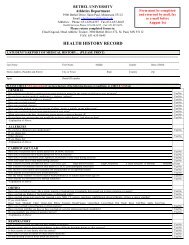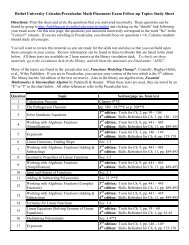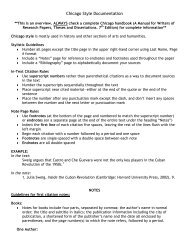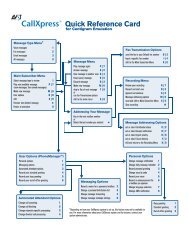here - College of Arts & Sciences - Bethel University
here - College of Arts & Sciences - Bethel University
here - College of Arts & Sciences - Bethel University
Create successful ePaper yourself
Turn your PDF publications into a flip-book with our unique Google optimized e-Paper software.
Education: Degrees in Finance and Political Science.<br />
Career: Financial analyst for a medium-sized banking concern in Montana.<br />
Approach <strong>of</strong> the critic to decision-making (for example, ad<strong>here</strong>nce to the trichotomy,<br />
stock-issues, policymaker, tabula rasa, etc.):<br />
Fundamentally, I’ll make my decision according to the criteria you give me in the round.<br />
If you want to run a values debate or “res-o’fact” go for it—just be prepared to justify<br />
your decision if the other team wants to challenge it. In terms <strong>of</strong> policy debate, I think <strong>of</strong><br />
myself as a policy maker. This is because I see policy debate as competition between the<br />
plan and the status quo and/or a counter-plan—my job is to decide which option is better,<br />
your job is to tell me what the implications <strong>of</strong> each option are, and (this is the important<br />
part…) what “better” means. If you think I should do something else, convince me, but in<br />
lieu <strong>of</strong> an argument on the matter, that’s my default position.<br />
While I certainly attempt to avoid letting my personal beliefs and biases influence the<br />
way I judge, I firmly believe that no one can ever be completely tabula rasa. I will not<br />
consciously intervene in a round.<br />
Relative importance <strong>of</strong> presentation/communication skills to the critic in decision-making<br />
:<br />
No one speaks 1000 words per minute or takes tremendous gulps <strong>of</strong> air mid-syllable in<br />
the real world. Since I presume that’s w<strong>here</strong> you’ll eventually end up, now would be a<br />
good time to start practicing for it. Speaking well and making good arguments are not<br />
mutually exclusive, and in fact, communicating well bolsters an argument by improving<br />
the credibility <strong>of</strong> the speaker.<br />
That said, I won’t pick you up or drop you based on presentation by itself. I judge the<br />
round on the flow. Naturally, if you are speaking in such a manner that I cannot flow you,<br />
well, that’s a problem for your position because as far as I’m concerned it doesn’t exist.<br />
Relative importance <strong>of</strong> on-case argumentation to the critic in decision-making:<br />
How much time and effort will be spent arguing on-case is purely a strategic choice that<br />
the Op gets to make in the LOC. If Op believes it can win entirely <strong>of</strong>f-case, go for it.<br />
Openness to critical/performative styles <strong>of</strong> debating:<br />
Critical debates are <strong>of</strong>ten poorly argued and messy; it’s not your fault, Parli is simply not<br />
designed with sufficient speaking times and number <strong>of</strong> speeches for critical arguments to<br />
fully develop (the rule against evidence in rounds is also problematic for kritiks as it<br />
leads to somewhat wild generalizations on philosophical points). I’m not anti-kritik, but<br />
please run it well and know what you’re talking about inside and out.<br />
138
















